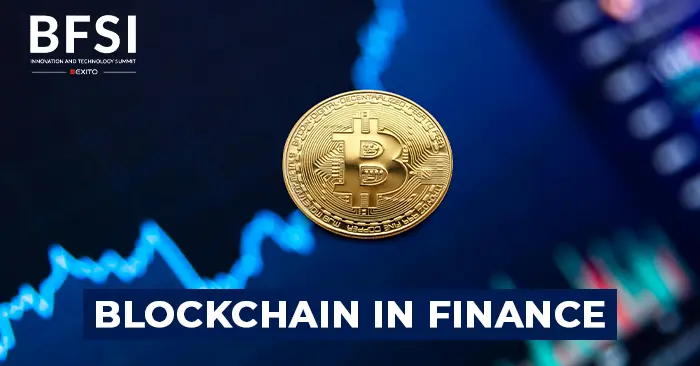Introduction:
Over the years, as we’ve witnessed the Finance Sector evolving, we noticed that certain innovations pose the cornerstone of progress, i.e., The Blockchain Technology. Blockchain emerges as a transformative catalyst, reshaping conventional norms and driving the industry towards an unconventional yet progressive path.
As Digital Technology continues its relentless growth, the adoption of Blockchain in the Financial Sector proves to hold immense value by unleashing its capability of fueling major shifts in transactional efficiency, data integrity, and trust establishment.
To further emphasize the benefits of blockchain in finance, we present to you a study that states “The global finance blockchain market is expected to grow at a CAGR of 89.2% from 2023 to 2030.” Yet, beyond the soaring statistics lies a human-centric narrative. it shows that the blockchain not only serves to optimize processes and drives profitability, but also acts as a source of empowerment and inclusivity.
Let’s dive into the cases of blockchain in finance, and the ability to revolutionize payments, streamline supply chains, and foster a more inclusive financial ecosystem.
1. Enhanced Financial Services: Faster, Affordable and Secure at a greater scale
Blockchain Technology Revolutionizes Financial Services by offering faster, cheaper, and more secure transactions at a larger scale. Its ability to ensure immutable digital transactions in real-time enhances speed, security, and scalability in services like money transfers, peer-to-peer payments, and trade finance. With reduced reliance on intermediaries and nearly foolproof tamper resistance, blockchain plays a key role in cutting down costs and minimizes frauds.
Due to its increased transparency, more trust and security is built, while simultaneously reducing transactional friction.
Moreover, its transparency fosters trust and security while reducing transactional friction. By facilitating digital identities, blockchain adds another layer of trust and security to financial transactions. In contrast, conventional financial processes rely on intermediaries and involve complex, time-consuming procedures that hinder efficiency.
Blockchain streamlines these processes, notably reconciliation, clearing, and settlement, reducing time and costs for financial institutions. Another major advantage of blockchain is that it eliminates manual document collection and sharing, practices that involve custom forms and insurance policies, further enhancing efficiency in the financial industry.
2. Simplifying Collateral Management and Commodity Tracking
Imagine effortlessly managing collateral for large loans or tracking commodities throughout their journey in the supply chain – all in real-time.
Digital technology has brought forth Blockchain technology to turn your imagination into reality. Through the emergence of blockchain, all of these processes are made faster, more transparent, and secure than ever before.
The benefits of blockchain in finance are vast, extending to areas like trade commodities as well. This capability offers invaluable insights into the chain of custody for insured commodities, particularly beneficial in insurance claims. By leveraging blockchain technology, businesses gain visibility into losses, enhancing accountability and efficiency across the board.
3. Tokenizing Real-World Assets for Everyone
Wouldn’t it be great if owning a fraction of real estate or private equity was just a few clicks away? well now nothing is impossible in the finance sector. Thanks to blockchain technology, it’s now possible through the tokenization of real-world assets.
Having the flexibility to sell easily or trade your rationalized assets, or even leverage them as collateral for loans, is a privilege that most of us crave. It’s only with the help of blockchain that this newfound accessibility and liquidity are empowering individuals and businesses alike.
Even Bank of America vouched for this feature of blockchain in finance by highlighting that the tokenization of real-world assets as a driving force behind the widespread adoption of digital assets. It’s not just about technology – it’s about making ownership and investment opportunities more inclusive and accessible to everyone.
4. Transitioning from Physical Currency to Digital Currency
As we grew up, we watched how the world slowly transitioned from using paper bills and metal coins towards the usage of digital currency. Knowing that digital transactions will not perish, adoption of a distribution network like blockchain seems imperative.
Experts highlight the keen interest of financial institutions in this blockchain application, anticipating reduced friction, enhanced transparency, faster transactions, cost savings, heightened security, and decreased financial crimes.
Notably, Deloitte’s 2022 “Merchant Adoption of Digital Currency Payments Survey” underscores this trend, revealing that 85% of respondents anticipate ubiquitous digital currency payments in their industry within five years. Similarly, the survey reflects substantial customer interest in digital currency, particularly among younger demographics.
Current blockchain initiatives within the financial sector are steering the global economy toward this transformation. While digital currency is still not a commonplace yet, at least for minute percentage of people, the momentum towards reaching that position is still undeniable.
5. Fortifying Credit Scores through Blockchain
Traditional credit scoring systems pose limitations, particularly in terms of mobility and security. This proves that universal credit score should be made a mandate, especially in light of recent security breaches like the Equifax incident, which compromised millions of consumers’ sensitive information.
Blockchain technology offers a solution by providing transparency and security to credit score management. By leveraging blockchain, lenders can access immutable records of financial transactions, enabling a more comprehensive assessment of an individual’s creditworthiness. Additionally, smart contracts ensure that personal information remains secure and confidential throughout the process. This innovative approach promises to change the way credit scores are managed, offering greater reliability and protection for consumers worldwide
6. Enhancing Efficiency in IPOs through Blockchain Decentralization
Escalating fees associated with venture capitalists, private investment firms, and banks during the IPO process has proved to be a matter of concern due its expensive nature. As a solution, equity markets are embracing decentralization facilitated by blockchain technology.
By eliminating middlemen, blockchain in finance streamlines the entire spectrum of investor-company interactions, ensuring security and slashing costs significantly.
7. Harnessing Blockchain to streamline fund investments
Investing in funds is not as efficient due to the high cost associated with it, manual processes, and disparate databases slowing down the procedure. However, with digital technology and the integration of blockchain technology in finance, providers can revolutionize this process.
By storing users’ legal, personal, and public information on a blockchain, providers can drastically reduce errors and fraud, enhance transparency during the digital transactions, and simplify data access. And by utilizing smart contracts, fund investment companies can swiftly retrieve user information without any hassle.Users can maintain control over their data, with access only granted upon their consent. In addition to that, users can monitor who accesses their information and for what purpose, ensuring transparency and accountability throughout the investment process.
Hence, the Blockchain in the finance sector has ensured that fund investment becomes as seamless as any other complex task that involves the risk of transparency, high costs and inefficiency.
Conclusion:
To summarize, blockchain technology and its transformative force has evidently revolutionized digital transaction and has defied outdated norms. Blockchain in the finance sector goes beyond simplification of financial processes, it strictly ensures transparency and inclusivity – two major traits that most traditional methods lack.Through the power of blockchain, digital technology empowers individuals and businesses alike, streamlining processes, reducing costs, and fortifying security. It eliminates intermediaries, simplifying transactions and ensuring data integrity.













